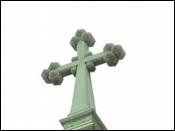KYW
September 15, 2006
http://cbs3.com/topstories/local_story_258063232.html
(AP) Philadelphia A year after a grand jury excoriated the Philadelphia Archdiocese for its handling of priests accused of abusing children, Cardinal Justin Rigali has called hundreds of priests to a meeting Friday to hear from three of the church's victims.
But critics, including the largest victims' advocacy group, call the response tepid compared to the legal reforms they want the church to endorse.
The priests will meet at the archdiocesan seminary in Wynnewood, where they will be addressed by a man and woman abused by priests as children, as well as a woman whose two sons were molested.
 |
| Photo by The CBS |
A three-year probe by a Philadelphia grand jury identified 63 archdiocesan priests as abusers since the 1950s and accused church officials of a cover-up. Twenty abusive priests have been defrocked and others have been relieved of pastoral duties.
The archdiocese selected the forum's participants without input from the most vocal victims' advocate group, and declined to say how they were selected or provide any details of their abuse.
Priests need to hear not only about the abuse, but also about the victims' struggles to rebuild their lives and hold onto their faith, said Mary Achilles, a victims' advocate retained by the church this year.
"If they're going to lead these people through the crisis, they need to stand and experience the pain," said Achilles, an organizer of the session.
The victims group, the Survivors Network of those Abused by Priests, is fighting for more tangible reforms such as the extension of time for the filing of civil suits. Members questioned the value of Friday's forum, which will be streamed live online but is not open to the public.
"It will look like an effort ... to make changes to improve the issues around sex abuse in the church," said victim Diane Freedman Drinker, 46, of Conshohocken, one of dozens of victims who testified before the grand jury. "But the fact is in the halls of Harrisburg they are lobbying against the laws that are necessary to protect children."
The Philadelphia grand jury found that archdiocesan leaders— including two former archbishops—hid the abuse by transferring problem priests and failing to notify authorities. Prosecutors bitterly concluded they could not file criminal charges because of Pennsylvania's statute of limitations.
Meetings like the one Friday are unusual though not unheard of since the Catholic sex abuse crisis erupted in 2002. Abuse victims addressed a meeting of the nation's bishops that year.
"This event on Friday is just a step," Achilles said. "It will not solve the problem. Its goal is simply for those who operate in the church currently to witness the pain and suffering of victims."
The archdiocese has also begun running advertisements in the local media inviting victims to call its office for assistance. There are nearly 1.5 million Catholics in the five-county archdiocese.
Rigali acknowledged the victims' pain and suffering after the grand jury report and promised reforms. But in a harshly worded statement, church attorneys called the grand jury "a sword to attack the church and build support for insidious pre-judgments."
SNAP and others want the church to lobby for reforms proposed by the grand jury, such as the creation of a one-year window in which victims could file civil lawsuits. The archdiocese opposes the one-year window, saying old claims would be difficult to defend and financially ruinous to the church, social service agencies and others.
"None of the (pending legislation) is aimed at hurting the church. It's about making the victims whole," said Michael
Piecuch, majority chief counsel to the House Judiciary Committee. "Many members would like to see the church emerge stronger from this. However, part of the healing process includes facing these issues head-on and being very clear publicly about the (church's) position and support of these bills."
While the Philadelphia archdiocese in December said it would support the lifting of criminal time limits and enhanced penalties for sexual abuse, such changes to criminal law cannot be applied retroactively.
Civil suits against priests and the archdiocese have largely failed in Pennsylvania because of legal time limits, relieving the archdiocese of the huge financial settlements that have bankrupt some other dioceses. Nationally, the clergy sex abuse scandal has cost the church more than $1.5 billion.
Any original material on these pages is copyright © BishopAccountability.org 2004. Reproduce freely with attribution.